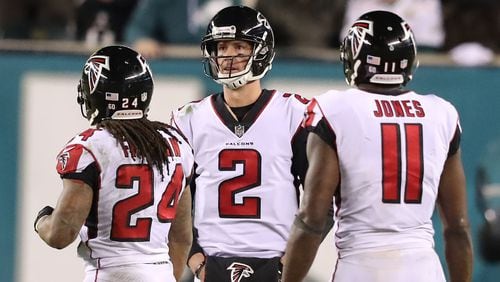The Falcons’ grew tired of critics continually measuring their offensive success this season against the Super Bowl team of 2016 -- and to be fair, nobody should have expected Matt Ryan would replicate his MVP season or the Falcons would average nearly 34 points per game again.
But the problem wasn’t that the Falcons didn’t look like they did last year. The problem was that too often they looked like they did in 2015.
Out of rhythm. Underachieving in the red zone. Stuck in too many third-and-longs and not converting.
They scored 10 points in Saturday's 15-10 playoff loss, and both of their scoring drives came gift-wrapped following Eagles turnovers. They punted on six out of nine possessions. On the play that decided the game and ultimately ended their season, the Eagles' defense knew what was coming.
From the time they broke the huddle. They were that predictable. It was underachievement that bordered on pathetic, given the roster’s talent level and built-in expectations.
What went wrong this season? It started in the offseason.
Here are five issues:
The Falcons hired Steve Sarkisian in the belief – at least in public dialogue – that his experience with the offense in college would lead to an easy transition from Kyle Shanahan. They were wrong.
From the opening game in Chicago to the final one in Philadelphia, there was ample evidence Sarkisian struggled to consistently: 1) Best utilize all of the team’s weapons; 2) Be creative and keep opposing defenses off balance, as Shanahan expertly did in 2016; 3) Avoid telegraphing plays, particularly in the red zone.
The Falcons were 1 of 3 in red zone situations and 1 of 2 in goal-to-go situations against the Eagles. They ranked only 23rd in the NFL in red zone touchdown percentage (50 percent) in the regular season. In their final four games (two regular season, two playoffs), they went 5-for-16 in the red zone.
They scored only five touchdowns in their last four games. That screams defenses basically knew what was coming.
The Eagles confirmed as much. Several Philadelphia defenders -- safeties Malcolm Jenkins and Rodney McLeod and end Brandon Graham among them – said they immediately read the Falcons’ play call on fourth-and-goal from the two-yard line, given ball placement (right hash mark), personnel package and alignment. They knew quarterback Matt Ryan would sprint right and try to hit Julio Jones in the end zone.
Jenkins said he sensed the play even before the Falcons’ broke huddle, based on film study. Then, “We recognized the formation as soon as they lined up,” he said.
Still, the play almost worked. Jones slipped and/or was interfered with by cornerback Jalen Mills and went to the ground. He got up, completed his route and leaped in the air for Ryan’s high pass but couldn’t pull it down.
We can debate the play call. It might’ve made more sense to spread out Philly’s defense to create space for receivers, maybe run a pick play. It wasn’t the best play but it wasn’t the worst either. The decision to attempt a shovel pass to third-string running back Terron Ward on second down also seemed dubious.
Sarkisian didn’t call one running play from first down at the nine, despite the fact Philly was struggling to stop Tevin Coleman, who had 79 yards on only 10 carries, as well as 14 yards on one reception. (Conversely, Devonta Freeman, who played the game on a sprained knee, had a miserable game: 10 carries for seven yards and he whiffed badly on an attempted block on a Philly blitz, leading to a sack of Ryan and Super Bowl flashbacks.)
But it shouldn’t have come down to the last play or the last drive. An offense with Ryan, Jones, Freeman, Coleman and Mohamed Sanu shouldn’t be telegraphing anything. Play-calling wasn’t the only problem this season but it was definitely one of the problems.
Dan Quinn fired two defensive assistants -- coordinator Richard Smith and defensive line coach Brian Cox -- after last season. The defense did not produce nearly as many turnovers this season and Vic Beasley took a step back but overall the unit improved.
The issues were on the offensive staff, following the losses of Shanahan and running backs coach Bobby Turner (to San Francisco) and quarterbacks coach Matt LaFleur (to the Los Angeles Rams). New quarterbacks coach Bush Hamdan has taken a job as Washington’s offensive coordinator so the Falcons need to replace him. Ryan’s play regressed. Here’s a thought: How about Matt Schaub as an assistant coach? The status of running backs coach Keith Carter and others is uncertain.
Many are screaming for Sarkisian’s firing, just as they did for Shanahan’s head after the 2015 season. But that would be surprising. One significant reason: There’s no obvious viable option for a replacement. There’s a limited number of coaches in the NFL who run this zone-blocking/West Coast scheme. Players also seem to genuinely like Sarkisian, for whatever that’s worth. And, yes, it was his first season.
As for any thought of LaFleur returning as offensive coordinator -- this is me responding to social media rants -- he has never called plays before. I mean, ever. At any level. Sarkisian at least called plays in college. But he needs to get better.
When guard right Chris Chester retired, the Falcons did not adequately replace him. When left guard Andy Levitre was injured, the center of their line got even worse. Ben Garland and Wes Schweitzer didn’t cut it. Poor guard play also (again) prevented the Falcons from having any semblance of a power running game, another factor in goal-to-go and short-yardage situations. Speaking of which:
Another offseason miscue was letting fullback Patrick DiMarco leave in free agency, or at least not adequately replacing him. Buffalo gave DiMarco a four-year, $8 million contract ($3.3 million guaranteed). The Falcons didn’t want to commit $2 million a year on the salary cap to a fullback. OK. But going cheap with Derrick Coleman ($690,000) wasn’t the answer, either. DiMarco could at least be a lead blocker. There were times when defensive tackle Dontari Poe was utilized as a blocking back with some success but that’s more of a cutesy gadget, not a permanent fix. The power run needs to be a more viable part of this offense but it’s not going to happen without improvement at fullback and guard.
There were two unexpected problems on offense, neither of which can be blamed on Sarkisian. One was the number of drops by receivers. The Falcons led the NFL with 30 drops in the regular season. Only one of the next 10 teams behind them in drops (Jacksonville) made the playoffs. Jones and Sanu had 13 between them.
The other disappointment was the poor play of second-year tight end Austin Hooper, who was expected to be a major part of the offense, particularly in the red zone. But he was limited to 49 catches and three touchdowns in the regular season.
He had zero touchdowns in the final nine games (regular season and playoffs). He was targeted just once (for three yards) against the Eagles and was limited to four catches for 18 yards in the two playoff games. It became clear the Falcons lost confidence in him, not good for a fairly high draft pick (third round, 81st overall). Having a more dependable veteran than Levine Toilolo behind him might’ve helped.
From the game: Falcons out of playoffs because offense failed them too often
Check out the new “We Never Played The Game” showpage at AJC.com/sports/we-never-played-the-game. Subscribe on iTunes or listen from AJC sports podcasts, the WSB Radio on-demand page and Google play.
About the Author






